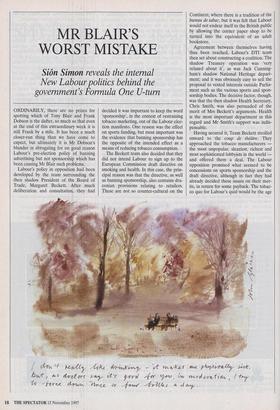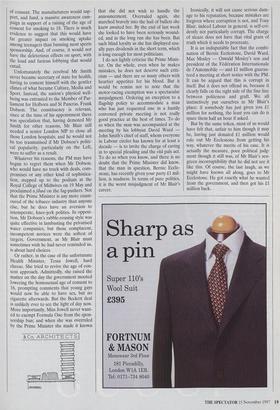MR BLAIR'S WORST MISTAKE
SUM Simon reveals the internal
New Labour politics behind the government's Formula One U-turn
ORDINARILY, there are no prizes for spotting which of Tony Blair and rank Dobson is the dafter, so much so that even at the end of this extraordinary week it is still Frank by a mile. It has been a much closer-run thing than we haye come to expect, but ultimately it is Mr Dobson's blunder in abrogating for no good reason Labour's pre-election policy of banning advertising but not sponsorship which has been causing Mr Blair such problems. Labour's policy in opposition had been developed by the team surrounding the then shadow President of the Board of Trade, Margaret Beckett. After much deliberation and consultation, they had decided it was important to keep the word `sponsorship', in the context of restraining tobacco marketing, out of the Labour elec- tion manifesto. One reason was the effect on sports funding, but most important was the evidence that banning sponsorship has the opposite of the intended effect as a means of reducing tobacco consumption.
The Beckett team also decided that they did not intend Labour to sign up to the European Commission draft directive on smoking and health. In this case, the prin- cipal reason was that the directive, as well as banning sponsorship, also contains dra- conian provisions relating to retailers. These are not so counter-cultural on the Continent, where there is a tradition of the bureau de tabac, but it was felt that Labour would not endear itself to the British public by allowing the corner paper shop to be turned into the equivalent of an adult bookstore.
Agreement between themselves having thus been reached, Labour's DTI team then set about constructing a coalition. The shadow Treasury operation was 'very relaxed about it', as was Jack Cunning- ham's shadow National Heritage depart- ment; and it was obviously easy to sell the proposal to vested interests outside Parlia- ment such as the various sports and spon- sorship bodies. The decisive factor, though, was that the then shadow Health Secretary, Chris Smith, was also persuaded of the merit of Mrs Beckett's arguments. Health is the most important department in this regard and Mr Smith's support was indis- pensable.
Having secured it, Team Beckett strolled onward to the coup de theatre. They approached the tobacco manufacturers the most unpopular, sleaziest, richest and most sophisticated lobbyists in the world and offered them a deal. The Labour opposition promised what seemed to be concessions on sports sponsorship and the draft directive, although in fact they had already decided these issues on their mer- its, in return for some payback. The tobac- co quo for Labour's quid would be the age of consent. The manufacturers would sup- port, and fund, a massive awareness cam- paign in support of a raising of the age of consent for smoking to 18. There is much evidence to suggest that this would have far greater impact on smoking uptake among teenagers than banning most sports sponsorship. And, of course, it would not have the deleterious effects on sport, with the loud and furious lobbying that would entail.
Unfortunately the cerebral Mr Smith never became secretary of state for health, having to content himself with the gentler climes of what became Culture, Media and Sport. Instead, the nation's physical well- being was entrusted to the Member of Par- liament for Holborn and St Pancras, Frank Dobson. The constituency is relevant, since at the time of his appointment there was speculation that, having demoted Mr Smith for other reasons, Mr Blair still needed a senior London MP to close all those London hospitals; and he would not be too traumatised if Mr Dobson's politi- cal popularity, particularly on the Left, were to suffer as a result.
Whatever his reasons, the PM may have begun to regret them when Mr Dobson, who would have no truck with deals, com- promises or any other kind of sophistica- tion, stepped up to the podium at the Royal College of Midwives on 19 May and proclaimed a jihad on the fag-pushers. Not that the Prime Minister is any more enam- oured of the tobacco industry than anyone else, but he does have an aversion to intemperate, knee-jerk politics. In opposi- tion, Mr Dobson's rabble-rousing style was quite effective in lambasting the privatised water companies, but those complacent, incompetent novices were the softest of targets. Government, as Mr Blair must sometimes wish he had never reminded us, is about hard choices.
Or rather, in the case of the unfortunate Health Minister, Tessa Jowell, hard cheese. She tried to revive the age of con- sent approach. Admittedly, she raised the matter on the day the government mooted lowering the homosexual age of consent to 16, prompting comments that young gays would now be able to have sex, but no cigarette afterwards. But the Beckett deal is unlikely ever to see the light of day now. More importantly, Miss Jowell never want- ed to exempt Formula One from the spon- sorship ban; and when she was overruled by the Prime Minister she made it known that she did not wish to handle the announcement. Overruled again, she marched bravely into the hail of bullets she knew awaited her. By the end of last week she looked to have been seriously wound- ed, and in the long run she has been. But such blind loyalty as she has displayed usu- ally pays dividends in the short term, which is long enough for most politicians.
I do not lightly criticise the Prime Minis- ter. On the whole, even when he makes mistakes, he does not deserve such criti- cism — and there are so many others with heartier appetites for his blood. But it would be remiss not to note that the motor-racing exemption was a spectacular misjudgment. Ordering an exception to a flagship policy to accommodate a man who has just requested one in a hastily convened private meeting is not really good practice at the best of times. To do so when the man was accompanied at the meeting by his lobbyist David Ward John Smith's chief of staff, whom everyone in Labour circles has known for at least a decade — is to invite the charge of caving in to special pleading and the old pals act. To do so when you know, and there is no doubt that the Prime Minister did know, that the man in question, Bernie Eccle- stone, has recently given your party £1 mil- lion, is madness. In terms of pure politics, it is the worst misjudgment of Mr Blair's career. Ironically, it will not cause serious dam- age to his reputation, because mistakes are forgiven where corruption is not, and Tony Blair, indeed Labour in general, is self-evi- dently not particularly corrupt. The charge of sleaze does not have that vital grain of truth which it needs to procreate.
It is an indisputable fact that the combi- nation of Bernie Ecclestone, David Ward, Max Mosley — Oswald Mosley's son and president of the Federation Internationale de l'Automobile — and £1 million guaran- teed a meeting at short notice with the PM. It can be argued that this is corrupt in itself. But it does not offend us, because it clearly falls on the right side of the fine line between politeness and graft. We all instinctively put ourselves in Mr Blair's place: if somebody has just given you £1 million for nothing, the least you can do is spare them half an hour if asked.
But by the same token, most of us would have felt that, unfair to him though it may be, having just donated £1 million would rule out Mr Ecclestone from getting his way, whatever the merits of his case. It is actually the measure, poor political judg- ment though it still was, of Mr Blair's sea- green incorruptibility that he did not see it like this. Of course, the last laugh, as we might have known all along, goes to Mr Ecclestone. He got exactly what he wanted from the government, and then got his £1 million back.











































































 Previous page
Previous page